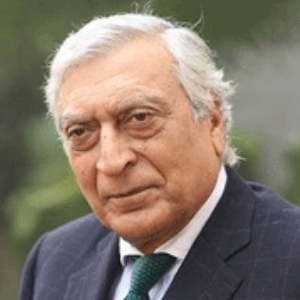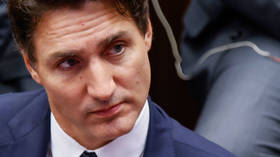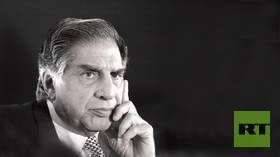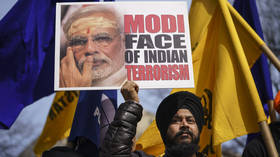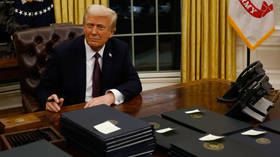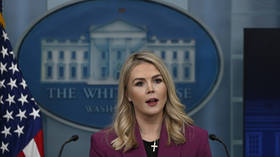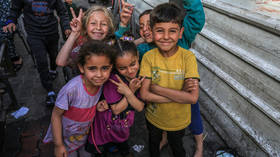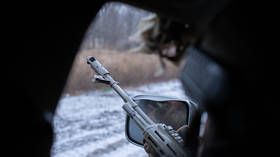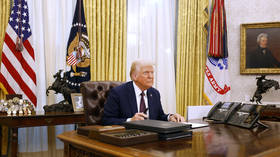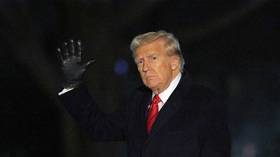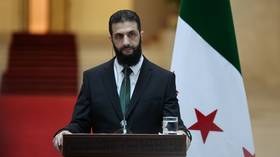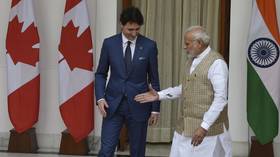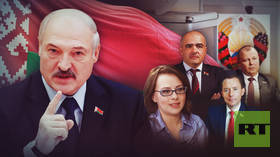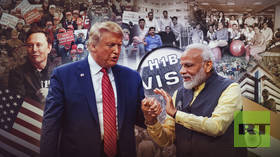Free speech for terrorists: How Canada shields dangerous extremists
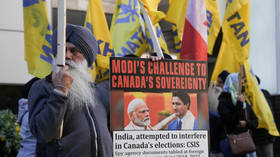
India-Canada ties have seriously broken down. The responsibility for this lies squarely on the shoulders of Canadian Prime Minister Justin Trudeau. And the spokesperson of India’s External Affairs Ministry has said so officially.
In September 2023, Trudeau stated on the floor of the Canadian Parliament that there were “credible allegations” that agents of the Indian government were involved in the killing on Canadian soil of Hardeep Singh Nijjar, an individual who was declared a terrorist by the Indian government. Nijjar had an Interpol red notice issued against him, was on the no-fly list in Canada, and had his bank accounts frozen there.
Nijjar had sought Canadian nationality based on a forged passport since 1997. His application was rejected three times, but eventually he obtained it in 2007. His terrorist affiliations can be judged from the fact that he celebrated on video about the killing of former Indian Prime Minister Indira Gandhi, a former Indian army chief, the former chief minister of Punjab and others. He is believed to have links with Pakistan, where he was photographed carrying an AK-47.
India has remonstrated with Canada time and again about its indifference to New Delhi’s persistent pleas to control these violent extremists on its soil who threaten India’s security, sovereignty, and territorial integrity. These people have held referendums for an independent country carved out of India’s Punjab state. They have issued death threats against Prime Minister Narendra Modi and burnt him in effigy. They have also issued death threats against the Indian ambassador in Ottawa, and displayed his photograph ridden with bullet holes.
Questionable reasoning
In the case of Nijjar, Trudeau claimed while testifying at a public inquiry into foreign interference last week that his country respects India’s sovereignty and territorial integrity and that India too should respect Canada’s sovereignty. His reasoning is unclear, because Canadian Sikh extremists – his own citizens under his government’s watch – are openly advocating India’s balkanisation.
Trudeau argues that freedom of speech in Canada permits such conduct. While he claims to oppose hate speech, he fails to address the openly hateful comments directed at the Indian prime minister, the Indian ambassador to Canada, the Hindu religion, and the Canadian Hindu diaspora.
He also confessed that when he first spoke in Parliament in September 2023 he had only “intelligence” information about India’s alleged involvement in the murder of Nijjar but no “hard evidentiary proof.” That the Canadian PM chose to make such a serious charge in Parliament against India without proof and knowing the kind of political storm he would raise shows how irresponsible and cavalier he is about serious matters of state.
Trudeau went on to say at the hearing that Canada now has more “indications” (still not evidence) about India’s involvement. For one year, New Delhi has been asking for evidence of the alleged involvement of its agents but to this day it has not been provided.
Again, in his statement at the hearing, Trudeau said that he had told Modi at the G20 summit in New Delhi in September last year that the evidence being asked of Canada was within India’s own security forces and that India should cooperate in finding it. In other words, India, on the basis of allegations, should ferret out evidence of the involvement of its agents in the killing of Nijjar, evidence that Canada does not have, and give it to the Canadian side. This kind of reasoning is bizarre.
While Canada seeks cooperation from New Delhi, it refuses to cooperate on the issues raised by Indian government and does nothing to curb anti-Indian extremists on its soil.
Canada has not acted on India’s 26 extradition requests against individuals involved in promoting terrorist activities.
Trudeau now claims that its year-long investigation has showed that the Indian ambassador in Canada – a professional diplomat who has served in many countries – is central to India’s efforts to gather “intelligence” on Canadian citizens seen as anti-Indian (this includes identifying them, taking their photographs demonstrating and burning the Indian flag, following their social media posts, etc.). The Canadian government claims that this “intelligence” is then passed on to the powerful Indian gang led by notorious criminal Lawrence Bishnoi in order to carry out planned killings.
The Trudeau government, including its security agencies, are conflating intelligence with the legitimate monitoring of the activities of local extremists conducted by a diplomatic mission for security reasons.
Canada’s recent diplomatic note to India designating the ambassador as “a person of interest” in a criminal investigation and asking for his immunity to be lifted was an outrageous provocation. New Delhi rejected the note and the Canadians were informed that our ambassador and other senior diplomats were being withdrawn as their security was being endangered, Canada then hastened to expel them to retain a public relations the upper hand, and India in turn decided to expel the Canadian acting ambassador, his deputy and four first secretaries.
The absurdity of Canadian allegations regarding the Bishnoi gang lies in that the mastermind, Lawrence Bishnoi, has been in prison in India since 2014. Some of his known associates are in Canada, and New Delhi has been seeking their deportation by name and requesting curbs on the activities of individuals attempting to incite violence in India. The Trudeau government has taken no action, which highlights the discrepancies and contradictions in Canada’s stance on the issue.
The departing Indian ambassador to Canada in an interview with a Canadian Indian channel has said categorically that till now no evidence has been provided to India, that the Canadian Foreign Minister is simply making political statements, and that Trudeau bears full responsibility for the downward spiral in India-Canada relations. He has also accused of the Canadian security agencies of being under political influence.
The extent of Trudeau’s bad faith can be judged from the fact that at the East Asia summit in Laos earlier this month he proposed that the National Security Advisers of the two sides meet, which India agreed to. The Canadian side also included the country’s Deputy Foreign Minister. This was supposed to be a confidential off-the-record meeting, but most unethically, the Canadian side briefed Washington Post correspondents in London and New Delhi on the details of the meeting with a self-serving slant. Normally, any sensible government would like to keep a back channel open. Clearly, the Trudeau government wants to score political propaganda points and have made sure that no back channel can now operate.
Five Eyes
At the parliamentary hearing Trudeau also said that the information on India’s activities had come from the Five Eyes intelligence grouping composed of the UK, the US, Canada, Australia, and New Zealand, as well as from some “South Asian” sources. The latter is a convenient way to mask Sikh extremists and their Pakistani links as the source.
As for the Five Eyes, the US is clearly involved because right from the time Trudeau spoke in Parliament in September 2023, top US officials including Secretary of State Antony Blinken and National Security Adviser Jake Sullivan have said that Washington was closely coordinating with Ottawa on the issue. The US has asked India quite peremptorily to cooperate with Canada.
India has its own issue with the US. Gurpatwant Singh Pannun, who is the center of a US-India row over the FBI thwarting a plot to murder him on US soil by an “Indian agent,” was designated as a terrorist by the Indian government in 2020. His organization Sikhs for Justice has also been labelled a terrorist outfit by India. Yet he is protected by the US.
Based on evidence provided by the US on the “Indian agent” plotting Pannun’s murder, the Indian side set up a committee of inquiry, the progress of which has been shared with Washington. As it turns out, the “agent” concerned has been involved in litigation against his own organization. He was arrested in December 2023 for attempted extortion and spent four months in jail. He has since been dismissed from government service.
Pannun has threatened to kill the Indian Prime Minister, to attack the Indian Parliament, the Delhi airport, and to down Air India planes. He made these threats on the eve of the FBI Director’s visit to India in December 2023. Most recently he has warned against travelling on Air India from November 1 to 19. Already there have been hoax calls about bombs aboard 100 flights of Indian airlines.
Washington refuses to take any action against him because of the “freedom of speech” excuse. In India, it is widely believed that he is a CIA asset. The US has been linking the Pannun case with the Nijjar case.
Double standards
On the one hand, in all India’s joint statements with the US, or in the statements of the G7 or G20 groupings, cooperation against terrorism figures prominently. Yet when it comes to terrorism directed at India by Sikh terrorists from the soil of the US, Canada, UK and others, there is no willingness to cooperate with India. These double standards are clear to India.
Not once has Washington asked Ottawa to cooperate with India regarding its concerns about Canadian Sikh extremists. These extremists also operate in the US, which has not acted against them despite fire-bombing of our consulate in San Francisco twice and referendums for an “independent Khalistan.” The US will put itself in a contradictory position if it were to demand that Canada cooperate with India while failing to address these issues itself.
Like Canada, the US too has not acted upon 61 Indian extradition requests issued in the last two decades. Many in New Delhi believe that elements of the deep state in the US, with Canada as its accomplice, want to retain the Sikh extremist card as a point of pressure on India, and use it to obtain concessions on issues of interest to it.
The Sikh community in Canada is locally concentrated and is large enough to be electorally critical in some constituencies. Trudeau has been cultivating the Sikh community electorally, like his father Pierre Trudeau who bears huge responsibility for the downing of the Air India plane in 1985 by not acting against the Sikh extremist Talwinder Singh Parmar who masterminded it, and whose extradition India was seeking. Trudeau has inherited a political legacy, to which has been added his woke thinking and his strong sense of entitlement.
He does not want to lose the Sikh vote – especially as the support of Trudeau’s partner in government until recently, Jagmeet Singh of the New Democratic Party, a known sympathizer of the ‘Khalistani’ cause, has been vital for the survival of his coalition government.
With Jagmeet Singh breaking the coalition, Trudeau is now in a minority in the parliament. His poll numbers are already very low, and not only to survive politically but also to hope to win the election next year, he is determined to preserve his Sikh support, believing that the extremists in the community are the gateway to this. India has officially decried Trudeau’s unconcern about India’s security as “vote bank politics.”
The fall-out of Canada’s willful destruction of ties with India will affect consular services, the education sector as the number of Indian students seeking admission in Canadian universities is huge and already the number of applicants is falling, movement of business delegations, and so on. India is not seeking to take retaliatory economic steps because under the Conservatives India-Canada relations had greatly improved and India must look beyond Trudeau.
However, as long as Trudeau is in power, India-Canada relations cannot be repaired. If the Conservatives come to power in the elections slated for next year, some effort to normalize ties can be made, but even then it will be a slow process because of the toxic Liberal-Sikh extremist nexus that is a strong undercurrent in the Canadian political system.
The statements, views and opinions expressed in this column are solely those of the author and do not necessarily represent those of RT.
